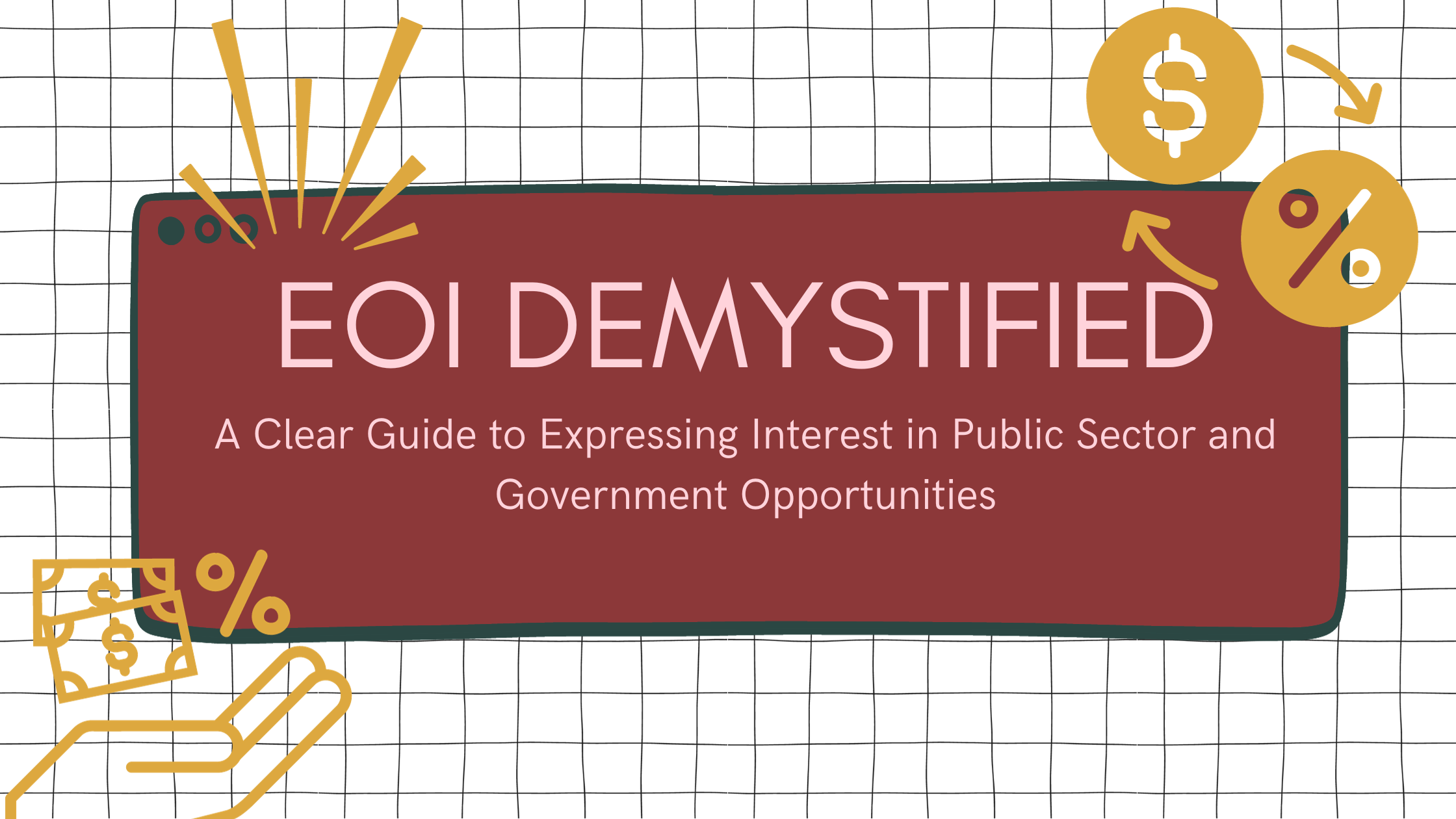Mastering Proposal Writing Services and RFP Writing: A Comprehensive Guide for Success

Need Help with Your Bid?
Get in touch by filling out the form and one of our advisors will be in contact.
Contact UsHow to Start a Bid Writing Business: Your Guide to Success
Embarking on the journey of starting a bid writing business involves a comprehensive understanding of the tender process and the ability to craft persuasive and compliant bids. Your success heavily relies on the proficiency to align your client's offerings with the requirements of the bid, ensuring that the proposals clearly demonstrate value, relevance, and superiority over competitors. A solid bid writing strategy is pivotal, utilizing a persuasive tone, precision, and a thorough grasp of the necessary details to make every submission count.

As you set the foundations for your bid writing business, it's crucial to establish a robust internal framework that includes the development of templates, a detailed approach to research, and a systematic method for addressing the criteria of each tender you work on. The establishment of a clear strategy on how you'll manage workflow, compliance, client relationships, and continual improvement of your bid writing processes can be a determinant factor in your business's capability to thrive and expand in the competitive landscape of bid writing.
Key Takeaways
- Leverage a strategic approach to align client offerings with bid requirements.
- Develop a systematic method to efficiently tackle tender criteria.
- Establish a continuous improvement process for bid writing proficiency.
Understanding the Bid Writing Landscape
In starting a bid writing business, comprehending the bid writing environment is fundamental. You must be proficient in identifying procurement opportunities and possess an in-depth understanding of tendering processes to successfully navigate this terrain.
Research and Procurement Processes
Your first step should be to understand the procurement processes. Whether it's public sector contracts or private engagements, each will have a distinct set of requirements. Engage in thorough research, exploring sector-specific portals that list opportunities for tendering for work. Regularly monitor these platforms to ensure you're aware of the latest opportunities and the specific procurement methodologies at play.
Identifying Potential Buyers
Identifying your potential buyers is crucial. Determine who the prominent players are within your chosen sectors and learn their buying habits. This might involve scrutinizing past contracts awarded and figuring out which types of services are frequently outsourced. Familiarize yourself with the public sector tendering mechanisms, as these will often have more standardized and transparent procurement cycles compared to the private sector.
Understanding Tender Documents
Understanding tender documents is the bedrock of successful bid writing. These documents, typically known as Invitation to Tender (ITT), contain all the specifications and requirements of the contract. You must be adept at interpreting these documents, extracting key information such as scope, criteria for selection, and submission deadlines. Your ability to dissect a tender and create a tailored response can set you apart in winning contracts.
Building a Solid Foundation
Starting a bid writing business requires meticulous planning and a strong skill set. Your success heavily depends on establishing a reputable presence and showcasing your capabilities effectively.
Developing Key Skills
Your journey as a bid writer begins with mastering core writing skills. It is imperative to communicate your ideas in plain English, using correct grammar and clear, concise language. Enhance your project management and communication skills to manage bids effectively and interact with clients professionally.
- Project Management: Understand the bid process from start to finish.
- Writing Skills: Craft persuasive and clear content, free from errors.
- Communication Skills: Engage and consult with stakeholders aptly.
In addition to these, developing the ability to provide persuasive evidence and relevant case studies will support your arguments in bids and resonate with potential clients.
Creating a Portfolio
Once you have honed your skills, creating a portfolio becomes your next vital step. Your portfolio should display a breadth of experience and a track record of success. Include samples of your work that highlight:
- Persuasive writing and successful grant bids
- Complex projects broken down into understandable language
- A variety of sectors to show versatility
This collection of past work allows prospective clients to assess your qualifications and provides tangible proof of your expertise.
Gaining Relevant Qualifications
While practical experience is crucial, acquiring formal qualifications or certifications can significantly bolster your credentials. Consider pursuing:
Certifications:
- Certified Bid Writer
- APMP Foundation Level Certification
Degrees:
- Bachelor’s or Master’s in English, Communications, or Business
Advancing your professional development through these recognized pathways not only enriches your knowledge but also demonstrates commitment to your career in bid writing. It assures clients of your dedication to maintaining high industry standards.
Setting Up Your Bid Writing Business

When starting a bid writing business, it's crucial to establish a strong foundation that includes a solid business plan, adherence to legal and financial requirements, and a robust marketing strategy. These components will support your success as you navigate the competitive landscape of bid writing.
Designing Your Business Plan
Creating a well-structured business plan is your first step. This plan should outline your business's goals, services offered, and target market. It's important to incorporate technology in your plan, as it plays a key role in bid management and project execution. Your business plan should also detail your sales and marketing strategies, which will drive your business's growth and profitability.
Legal and Financial Considerations
To legally operate your bid writing business, you must register your company and understand your legal obligations. Choose the appropriate business structure, such as sole proprietorship, partnership, or limited company, as this will affect your taxes and personal liability. Address financial considerations by setting up business banking accounts, understanding funding requirements, and planning for profit margins. Consult with a legal professional to mitigate potential risks and ensure compliance with industry standards.
Marketing Your Services
Develop a compelling marketing strategy to promote your bid writing services. Your strategy should leverage both online and offline channels to attract clients. Design a professional website and use social media to enhance your communication with potential clients. Consider the value of outsourcing portions of your marketing to experts if it aligns with your strategy. As you grow, you may choose to work with freelance bid writers to scale your operations without compromising quality or responsiveness.
Remember, a confident start is key to establishing a successful bid writing business, focusing on detailed planning, compliance, and strategic marketing efforts.
Mastering the Tender Submission Process
To thrive in the bid writing business, mastering the tender submission process is vital. Your success hinges on formulating a robust strategy, meticulous time management, and an unerring focus on compliance and quality control. The following subsections are crafted to guide you through the nuances of creating a winning bid.
Developing a Winning Strategy
Your strategy should begin with a thorough review of the evaluation criteria. Understand what the client values most and how you can align your bid submission to meet those needs. It's imperative to build a track record of successful tenders by focusing on your unique selling points and how they benefit your potential clients. Remember, a winning bid not only answers a client's questions but also clearly presents a compelling case for why your business stands out.
Effective Time Management
Time management is the backbone of any successful submission. Develop a time-bound schedule, setting strategic deadlines well before the actual submission date to allow ample time for review and proofreading. Avoid common pitfalls by breaking down the project into manageable tasks. A well-planned bid submission schedule should have clear milestones, such as first drafts, internal reviews, and final edits, to ensure you submit your bid in a timely manner.
Ensuring Compliance and Quality
The final and perhaps the most critical element in the tender submission process is ensuring both compliance and quality. Ensure your submission is fully compliant with the request parameters and format. Meticulous proofreading is essential to eliminate spelling mistakes and grammatical errors. Create a checklist to confirm that all requirements are addressed, and seek feedback from colleagues to further refine the bid. Your attention to detail here will reflect the quality of your work and further bolster your client's confidence in your business.
Growing Your Bid Writing Business
To effectively grow your bid writing business, focus on strategic expansion of services, harnessing technology for efficiency, and building a robust network for increased opportunities.
Expanding Services and Offering Training
Your business can achieve significant growth by diversifying the services offered. Consider implementing a variety of tender services such as tender improvement consultation, flexible writing options to cater to different SME needs, and offering personalized bid writing training. Establishing yourself as a tender mentor promotes professional development within the industry and can lead to long-term client relationships.
Leveraging Technology and Tools
Invest in technological solutions like a Tender VLE or Discover Elite to streamline the bid process, fostering a more organized and productive operation. Utilize software to track progress, manage documents, and maintain communication with your team and clients. The right technology can drastically enhance the quality and consistency of your submissions.
Networking and Collaboration
Networking is critical in a service-based industry. Attend industry events, join professional groups, and actively engage on platforms relevant to your clientele. Consider forming partnerships with other SMEs to expand your reach. Collaboration opens the door to new markets and provides opportunities to learn from peers and enhance your service offerings.
Frequently Asked Questions

In this section, we address some of the most common inquiries you might have as you explore the world of bid writing and consider starting your own business in this niche.
What are the essential steps for starting a bid writing business?
To start a bid writing business, you need to first conduct market research to understand your potential clients' needs. Next, create a business plan, register your business legally, and set up an accounting system. Establish a strong online presence by building a professional website and utilize social media for marketing.
What are some effective strategies for writing winning bids on freelancing platforms?
When writing bids on freelancing platforms, tailor each proposal to the client's specific needs, showcase your experience, and explain your approach. Be concise, yet persuasive, and always include past success rates or testimonials if available.
What qualifications or courses are recommended for someone pursuing a career in bid writing?
Potential bid writers should consider qualifications in fields like business, journalism, or English. Professional courses focused on bid and proposal management can also be highly advantageous.
What is the average salary for a bid writer, and what factors influence it?
The average salary for a bid writer varies widely depending on experience, location, and the industry you're in. Seniority, specialized knowledge, and a proven track record of winning proposals can lead to higher compensation.
Is there a demand for bid writers in the current job market?
Yes, there is demand for skilled bid writers, especially in sectors like construction, healthcare, and government services where contracts are typically won through bidding processes.
What are the key skills necessary for success in bid writing?
Critical skills for bid writing success include excellent writing and editing abilities, strong research and analytical skills, attention to detail, and the ability to work under tight deadlines. Having persuasive communication abilities is also crucial for crafting compelling bids.
Ready to start your search?
Get in touch by filling out the form to the right and one of our advisors will curate a personalised selection for you.
Get in touchBlogs. Guides. Helpful advice.

Mastering Proposal and RFP Writing for Government and Public Sector Opportunities

Proposal and RFP Writing Services: Enhancing Public Sector Tender Outcomes

.svg)